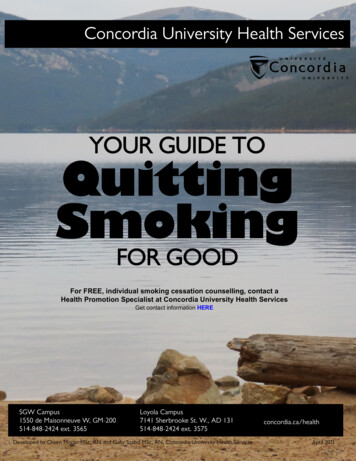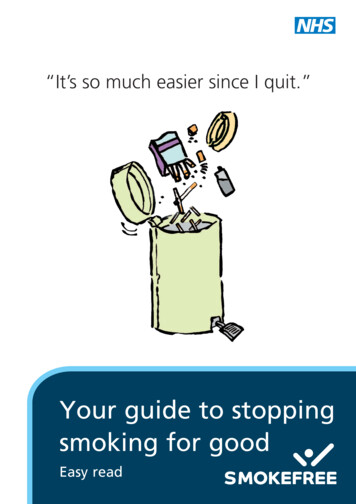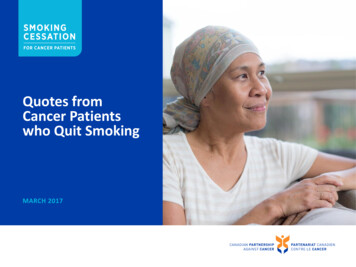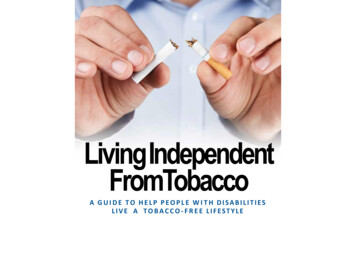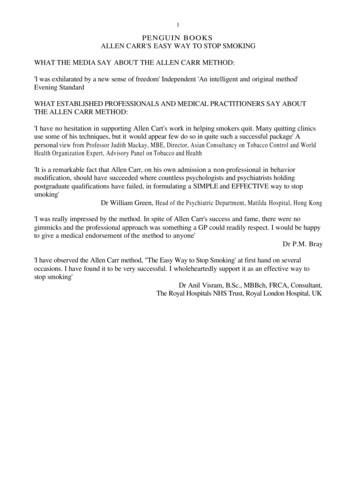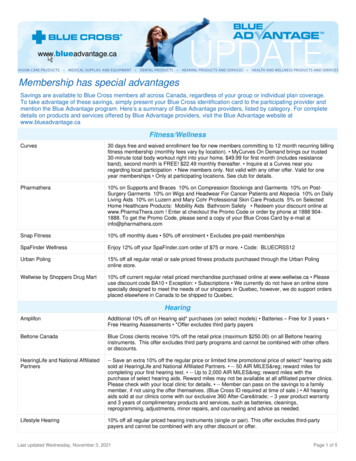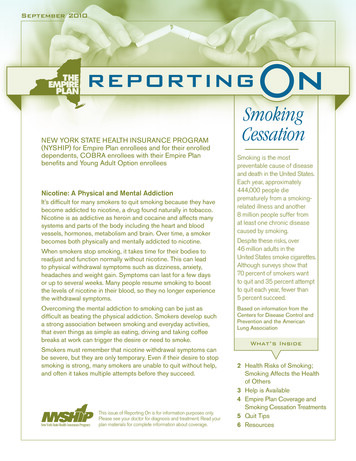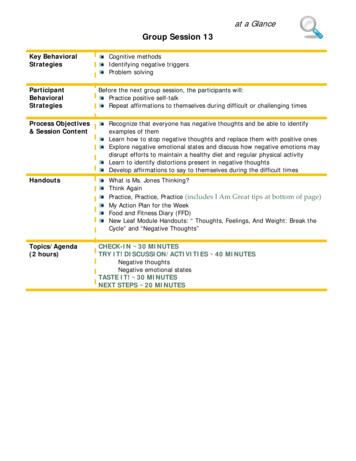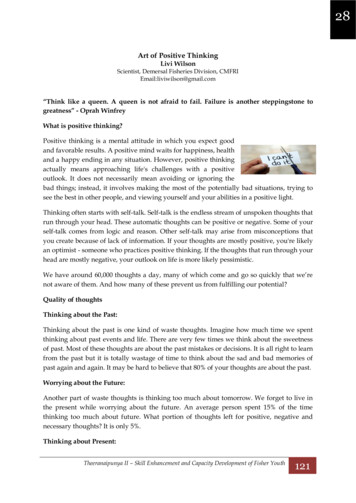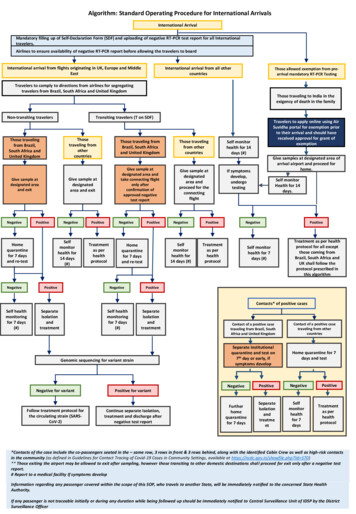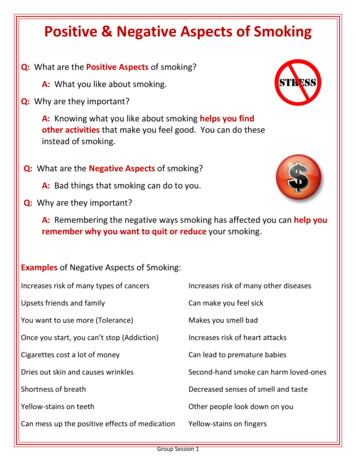
Transcription
Positive & Negative Aspects of SmokingQ: What are the Positive Aspects of smoking?A: What you like about smoking.Q: Why are they important?A: Knowing what you like about smoking helps you findother activities that make you feel good. You can do theseinstead of smoking.Q: What are the Negative Aspects of smoking?A: Bad things that smoking can do to you.Q: Why are they important?A: Remembering the negative ways smoking has affected you can help youremember why you want to quit or reduce your smoking.Examples of Negative Aspects of Smoking:Increases risk of many types of cancersIncreases risk of many other diseasesUpsets friends and familyCan make you feel sickYou want to use more (Tolerance)Makes you smell badOnce you start, you can’t stop (Addiction)Increases risk of heart attacksCigarettes cost a lot of moneyCan lead to premature babiesDries out skin and causes wrinklesSecond-hand smoke can harm loved-onesShortness of breathDecreased senses of smell and tasteYellow-stains on teethOther people look down on youCan mess up the positive effects of medicationYellow-stains on fingersGroup Session 1
Positive & Negative Aspects of SmokingKnowing what you like about smoking helps you find other activities that makeyou feel good. You can do these instead of smoking.What do I like about smoking?helps me feel calm when I am nervoushelps me feel better when I am sadalternative:alternative:helps my symptoms get betterhelps my medication side effects get betteralternative:alternative:is something to do when I’m boredis something to do with other peoplealternative:alternative:smells / tastes goodhelps me ve:Remembering the negative ways smoking has affected you can help youremember why you want to quit or reduce your smoking.How does smoking affect me?coughingshortness of breathcigarettes cost a lot of moneycan’t stop smoking (addiction)smells badupsets family / friendsneed to keep smoking moresecond-hand smoke can harm othersyellow stains on teethyellow stains on fingersother people look down on mesmoking interferes with medicationsdry skin / wrinklescan’t smell / taste things as wellGroup Session 1
Habits, CCravings,ravings, aandnd TTriggersriggersHabits,Q: What is a habit?A: A routine--or smoking without thinking about it.Q: What can I do if I smoke out of habit?A: Notice when I’m smoking smoke, and break my routine.Q: What is a craving?A: A strong physical urge to smoke.Q: What can I do if I have a craving?A: Do a non-smoking activity, andkeep my hands and mouth busy.Q: What is a trigger?A: Something that causes a craving – a person, place, thing, or feeling, thatmakes you want to smoke.Q: What can I do about triggers?A: Notice your triggers, and stay away or get away from them.Group Session 3
Habits, CCravings,ravings, aandnd TTriggersriggersHabits,If you smoking out of habit, notice when you smoke, and break your routine.How will I change my routine?Move my cigarettes to .Move my ashtrays / lighters / matches to .Change my morning routine by .During free time at the program, I can .If you have a craving, do a non-smoking activity that keeps your hands andmouth busy.What activity will I try when I have a craving?eat a healthy snackchew a piece of gumplay cardsknit or drawtalk to someone one of these people:go somewhere I can’t smoke:Notice your triggers, and stay away or get away from them.How will I get away from triggers?spend time with non-smokersleave areas that smell like smokeask friends not to offer me cigarettesstay away from the place I by cigarettesgo somewhere I don’t smoke:Group Session 3
Effects of Smoking & Benefits of QuittingSmoking affects the body in many ways.It can have negative effects on all these systems:LungsHeartLiverStomachImmune systemSkinThe Good News on Quitting!Quitting increases your life expectancy, so you live longer and better.24 hours after quitting, chances of having a heart attack decrease.Within a month or two, you can feel your lungs working better. You have moreenergy and no more cough.Quitting will lower your chances of having a stroke or getting cancer.The people you live with will be healthier.Group Session 2
Effects of Smoking & Benefits of QuittingHow has smoking affected my health?hard to breathecoughingasthmaemphysemalung cancermouth cancerheart attackstomach or other cancerhigh blood pressureheart beats really fastlow energyliver problemsdry skinyellow fingers or teethThe Good News on Quitting!Quitting increases your life expectancy,so you live longer and better.24 hours after quitting, chancesof having a heart attack decrease.Within a month or two, you can feel yourlungs working better. You have moreenergy and no more cough.Quitting will lower your chances ofhaving a stroke or getting cancer.The people you live with will be healthier.Group Session 2
High Risk SituationsQ: What is a high risk smoking situation (HRS)?A: It is a situation that always makes a person want to smoke. HRS can be:1) One BIG trigger (such as meals, coffee, or waking up in the morning)2) Two or more small triggers (such as smelling smoke and seeing peoplesmoke)Finding My HRSWhat are my triggers?feeling stressed or worriedfeeling sad or depressedfeeling angryseeing people smokingsmelling smokefeeling boredseeing lighters or matchesseeing ashtraystalking about smokingwaking up in the morningspending time with friendseating a mealtime around AA or NAspending time with familydrinking coffeeusing drugs or alcoholbeing in a place where I usually smokeGroup Session 4
High Risk SituationsA high risk smoking situation (HRS) is a situation that makes a person want tosmoke because it has:One BIG trigger (such as a meal or coffee), orTwo or more small triggers (such as smelling smoke and seeing peoplesmoke)What are my High Risk Situations with one BIG trigger?1)2)What are my High Risk Situations with two or more small triggers?1)2)Group Session 4
Coping with Side Effects of Quitting SmokingQ: What causes side effects of quitting?A: Withdrawal symptoms occur when someone stopssmoking because the body is used getting nicotine.These side effects are how the body tells someone thatit needs more nicotine. The longer a person goeswithout smoking, the better the side effects get.Q: What is NRT?A: “Nicotine Replacement Therapy” contains nicotine the bodycraves. It comes in many forms, such as: lozenge, gum, andpatch. It helps people who are quitting cigarettes cope withcravings.Q: What about medications?A: A person’s doctor may prescribe a certain type of medication(called Buproprion, Wellbutrin, and Zyban) that helps withquitting.Some options:SymptomReliefFeeling irritable, cranky, anxious .Take a walk or a hot bath, do relaxationDepressed mood Do something fun, talk to someoneFeeling restless Take a walk, do relaxation, do something funTrouble sleeping Avoid caffeine, do relaxationTrouble thinking clearly/concentrating .Plan light workload, ask for help, avoid stressFeeling hungry/weight gain .Drink water or low-cal drinks, eat low cal snacksConstipation, gas, stomach pain .Drink lots of fluids, eat high-fiber foods (fruits,vegetables, grains)Group Session 5
Coping with Side Effects of Quitting SmokingSide effects of quitting happen when the body starts recovering repairing itself.The longer a person goes without smoking, the better the side effects get.How do side effects of quitting and withdrawal symptoms affect me?feel sadhave trouble sleepingfeel stressedfeel restlesshave trouble thinking or concentratinghave gashave stomach painfeel constipatedfeel irritable or cranky gain weightfeel hungryfeel cravings for cigarettes – strong physical urges smoke (5-10 minutes)What can I do to cope with side effects of quitting?try the nicotine lozenge, gum, or patchtry a medication, like Zyban, from my doctoruse a piece of sugar-free gum or candyhold a pencil, tennis ball, or stress ballplay a game or cardstalk to someone:go somewhere I can’t smoke:Group Session 5
Avoiding & Escaping HRSQ: What can I do about High Risk Situations?A: Try one of these options:1. Avoid the situation by staying away from it.2. Escape the situation by leaving it.What can I do to avoid HRS?get rid of ashtrays, lighters, and matches, which can be triggeringspend time with non-smokers:spend time in non-smoking places:distract myself with non-smoking activities:What can I do to escape HRS?practice refusing cigarettes and invitations to smokeoffer to do a non-smoking activity instead of smokingtell people when a situation is triggering and leavego for a walk and go to a non-smoking place, such as:Group Session 6
Avoiding & Escaping HRSMy Plan for Avoiding & Escaping HRS:To stay away from , I will .(HRS)(way to avoid HRS)To stay away from , I will .(HRS)(way to avoid HRS)To stay away from , I will .(HRS)(way to avoid HRS)When I am , I will .(HRS)(way to avoid HRS)When I am , I will .(HRS)(way to avoid HRS)When I am , I will .(HRS)(way to avoid HRS)Group Session 6
Refusal SkillsQ: Being offered cigarettes or asked to smoke with a friend can trigger me tosmoke. What can I do about it?A: Learning to nicely turn down cigarettes and invitations can be helpful.Q: What if I feel uncomfortable or pressured?A: Here are a few easy steps to follow. Role-playing these steps with a friend orPeer Mentor may be helpful practice for turning down cigarettes, people whoask you to smoke, or any other situation in which you may feel uncomfortablesaying no to someone.Step 1: Make eye contact.Step 2: Tell the person that you cannot dowhat he/she asked you to do.Step 3: Give a reason why you cannot do it.Step 4: Offer an alternative.Who can I practice with?my Peer Mentor:my family member:my friend:someone else:Group Session 7
Refusal SkillsStep 1: Make eye contact.Step 2: Tell the person that you cannot do what he/she asked you to do.Step 3: Give a reason why you cannot do it.Step 4: Offer an alternative.What situation will I practice?someone offering me a cigarettesomeone asking me to smoke with him/hersomeone asking me to do something that could trigger me to smokewhat activity?something else:Group Session 7
Leaving Stressful SituationsQ: Why are stressful situations important?A: Stress can trigger someone to smoke, so leaving stressful situations can behelpful to someone trying to quit smoking.Q: What can I do to deal with stressful situations?A: Follow these steps:Step 1: Determine if the situation is stressful.Step 2: Tell the other person that situation isstressful and that you must leave.Step 3: If there is a conflict, tell the otherperson that you will discuss it anothertime.Step 4: Leave the situation.How do I know if a situation is stressful?I feel:tensefrustratedworriedI do:shakesweatyellafraidangryfeel my heart racingWho can I practice with?my Peer Mentor:my family member:my friend:someone else:Group Session 8
Leaving Stressful SituationsStep 1: Determine if the situation is stressful.Step 2: Tell the other person that situation is stressful and that you mustleave.Step 3: If there is a conflict, tell the other person that you willdiscuss it another time.Step 4: Leave the situation.What situations will I practice?Group Session 8
Asking for SupportQ: Why should I ask other people for support?A: People who are quitting smoking do better when other people support andhelp them.Q: Who should I ask and how can I ask others for support?A: Follow these steps:Step 1: Identify an appropriate support person and atime and place to speak with them.Step 2: Tell your support person that you are planning onquitting smoking and the reasons why.Step 3: Ask the person if they could be a support personand tell them why you are asking.Step 4: Tell the person the type of support you need andwhat you are asking of them.Step 5: Thank the person.Who can I ask for support?my family member:my friend:someone else:Who can I practice with?my Peer Mentor:my family member:my friend:someone else:Group Session 9
Asking for SupportStep 1: Identify an appropriate support person and a time and place tospeak with them.Step 2: Tell your support person that you are planning on quittingsmoking and the reasons why.Step 3: Ask the person if they could be a support person and tell themwhy you are asking.Step 4: Tell the person the type of support you need and what you areasking of them.Step 5: Thank the person.Who can I ask for support?my family member:my friend:someone else:How can someone support me?not offer me cigarettestalk to me about my goals quitting/reducingtalk to me about triggers/problemsdo a non-smoking activity with meGroup Session 9
Coping with DepressionQ: Why is important to think about coping with depression?A: Some people smoke more cigarettes to help them cope with feeling sad ordepressed.Q: What can I do if smoking helps me cope with depression?A: Try any of these things, and plan ahead: talk to someone, dosomething pleasant, problem-solve, or talk to the doctor.Who can I talk to if I feel sad?my family members:my friends:my Peer Mentor:my doctor:someone else:What can I do?watch TV or a movieeat something, like a healthy snackplay cardsgo to an AA or NA meetinggo to a groupgo outside or for a walkread a bookdraw, knit, or writelisten to musicHow can I get help to problem-solve?This works best if there is a certain problem that is making you sad.1. Figure out what the problem is:2. Talk to someone (like a counselor) about the problem and possible solutions.Group Session 10
Coping with DepressionWho can I talk to if I feel sad?my family members:my friends:my Peer Mentor:my doctor:someone else:What can I do?watch TV or a movieeat something, like a healthy snackplay cardsgo to an AA or NA meetinggo to a groupgo outside or for a walkread a bookdraw, knit, or writelisten to musicMy Plan for Coping with DepressionWhen I feel sad/down/depressed, I will: .If that does not help, I will: .A third thing I will try is: .Group Session 10
Coping with Anxiety and StressQ: Why is it important to think about coping with anxietyand stress?A: Some people smoke more cigarettes to help them copewith feeling anxious or stressed out.Q: What can I do if smoking helps me cope with anxiety andstress?A: Try any of these things, and plan ahead: talk tosomeone, do something relaxing, problem-solve, or talkto the doctor.Who can I talk to if I feel anxious or stressed out?my family members:my friends:my Peer Mentor:my doctor:someone else:What can I do?listen to calming musicpractice deep breathingpractice meditation/relaxationgo outside or for a walkread a bookdraw, knit, or writeHow can I get help to problem-solve?This works best if there is a certain problem that is making someone worry.1. Figure out what the problem is:2. Talk to someone (like a counselor) about the problem and possible solutions.Group Session 11
Coping with Anxiety and StressWho can I talk to if I feel anxious or stressed out?my family members:my friends:my Peer Mentor:my doctor:someone else:What can I do?listen to calming musicpractice deep breathingpractice meditation/relaxationgo outside or for a walkread a bookdraw, knit, or writeMy Plan for Coping with Anxiety and StressWhen I feel sad/down/depressed, I will: .If that does not help, I will: .A third thing I will try is: .Group Session 11
Coping with Low MotivationQ: Why is important to think about coping with lowmotivation?A: Many people experience changes in their feelings aboutquitting smoking. Preparing for these times can helppeople stay on track with their goals, even if they are lessfocused on smoking.Q: What can I do if I feel less motivated to quit smoking?A: Try any of these things, and plan ahead.Who can I talk to if I feel less motivated to work on my smoking goals?my family members:my friends:my Peer Mentor:my doctor:someone else:What can I do?list the reasons I wanted to quit:think about how life is better with fewer or no cigarettes:do something to reward myself for all my hard work:Group Session 12
Coping with Low MotivationWho can I talk to if I feel less motivated to work on my smoking goals?What can I do?list the reasons I wanted to quit :think about how life is better with fewer or no cigarettes:do something to reward myself for all my hard work:My Plan for Coping with Low MotivationWhen I feel less motivated, I will: .If that does not help, I will: .Group Session 12
Coping with BoredomQ: Why is it important to think about coping with boredom when quittingsmoking?A: Many people use smoking as an activity when they feel bored. Boredom can bea trigger.Q: What can I do if boredom is one of my triggers?A: Try doing other, non-smoking activities, and plan ahead!Who can I talk to if I feel bored?my family members:my friends:my Peer Mentor:my doctor:someone else:What can I do?listen to musicplay cardsread a book or magazinework on a puzzlego for a walkwatch TV or a movieGroup Session 13
Coping with BoredomPlan for Coping with Boredom(1)Think of activities you like to do that don’t involve smoking.(2)Pick an activity that you like and try it out!(3)Keep doing that activity, or pick another one to do.Who can I talk to if I feel bored?What can I do?listen to musicplay cardsread a book or magazinework on a puzzlego for a walkwatch TV or a movieGroup Session 13
Making Small TalkQ: Why is making small talk important when you quit smoking?A: Lots of people smoke when they socialize. Spending more time with nonsmokers will help you avoid being triggered by other people smoking.Q: How can I practice making small talk?A: Here are a few easy steps to follow. Using these steps with a friend or PeerMentor may be helpful practice for making conversation with people you don’tknow very well.Step 1: Make eye contact and say hello.Step 2: Ask a general question.Step 3: Make small talk by asking questionsabout an appropriate topic.Step 4: Give a reason and say goodbye.Who can I make small talk with?my Peer Mentor:my family member:my friend:someone else:Group Session 14
Making Small TalkStep 1: Make eye contact and say hello.Step 2: Ask a general question.Step 3: Make small talk by asking questions about an appropriate topic.Step 4: Give a reason and say goodbye.What general questions can I ask?How are you?What appropriate topics can I ask about?WeatherSportsFoodMovies/TV/MusicGroup Session 14
Making PlansQ: Why is making plans with a friend important when you quit smoking?A: Spending time with other people who are smoking may trigger you to want tosmoke, so you may want to spend more time with non-smokers, which couldmean making plans with them.Q: How can I practice making plans?A: Here are a few easy steps to follow. Using these steps with a friend or PeerMentor may be helpful practice for making plans with people you don’t knowvery well.Step 1: Make eye contact and say hello.Step 2: Ask a general question.Step 3: Invite the person to do a funnon-smoking activity with you.Step 4: Confirm the invitation then give areason and say goodbye.Who can I make plans with?my Peer Mentor:my family member:my friend:someone else:Group Session 15
Making PlansStep 1: Make eye contact and say hello.Step 2: Ask a general question.Step 3: Invite the person to do a fun non-smoking activity with you.Step 4: Confirm the invitation then give a reason and say goodbye.Who can I make plans with?What non-smoking activities can we do?Go out to eatWatch a moviePlay a board game/cardsGroup Session 15
Coping with LapsesQ: What is a lapse?A: A lapse is when someone who quit smoking decides to smoke a cigarette. Itcan happen if the person is experiencing a high risk situation or dealing withother triggers. The problem with lapses is they can become relapses.Q: What is a relapse?A: A relapse is when a person returns to smoking cigarettes. It is easier to stayquit after a lapse than quit smoking again after a relapse. The most importantthing to do is plan ahead for lapses.Planning for a Lapses:1) Stop! Keep calm!Go to a quiet, calm place away from the situation.Read your list of reasons you want to quit smoking.2) Remember your hard work.Remember how far you have come and how hard you haveworked to get there.3) Use your plan: Get rid of all cigarettes and other triggers. Escape the high risk situation. Distract yourself with a non-smoking activity.4) Ask for help.Group Session 19
Coping with LapsesMy Plan:1) Stop! Keep calm!Where can I go that I will not be triggered to smoke?2) Remember your hard work.What have I accomplished so far?Why do I want to quit smoking?3) Use your plan: Get rid of all cigarettes and other triggers. Escape the high risk situation. Distract yourself with a non-smoking activity.What activities can I do?4) Ask for help.Who can I ask?Group Session 19
Other Substances as Triggers for SmokingQ: Why is it important to think about other substances people usewhen they are quitting smoking cigarettes?A: Using other substances can be a high risk smokingsituation.Q: How are other substances high risk situations, and whatcan I do about them?A: The lists below explain how other substances can triggersmoking and what to do about those situations.Using other substances (alcohol, drugs, even coffee) can be a HRS forsmoking because:1. These substances are often strong triggers for smoking (e.g., coffeeand cigarettes, beer and cigarettes). That is, you are used to smokingwhen you drink coffee or alcohol or use drugs.2. When you are under the influence of drugs or alcohol it is harder tomake good decisions about not smoking.3. Situations in which people use drugs or alcohol are more likely to besituations where people are smoking cigarettes and cigarettes arearound.Skills to use:1. Avoid or Escape the high risk situation2. Practice Refusal SkillsGroup Session 20
Other Substances as Triggers for SmokingHow can using other substances be a high risk smoking situation?1. These substances are often strong triggers for smoking (e.g.,coffee and cigarettes, beer and cigarettes). That is, you areused to smoking when you drink coffee or alcohol or use drugs.2. When you are under the influence of drugs or alcohol it isharder to make good decisions about not smoking.3. Situations in which people use drugs or alcohol are more likelyto be situations where people are smoking cigarettes andcigarettes are around.What substances trigger me to smoke?CoffeeSodaAlcoholDrugs:What can I do if using other substances triggers me to smoke?1. Avoid or Escape the situation by:.2. Practice refusal skills.Group Session 20
Coping with Negative FeelingsQ: Why is it important to think about coping with negative feelings?A: Some people smoke more cigarettes to help them copewith feeling anxious, stressed out, sad, depressed, angry,irritable, or frustrated.Q: What can I do if smoking helps me cope with negativefeelings?A: Try any of the things listed below, and plan ahead:General coping strategies:1) Talk to someone.2) Get help. / Solve the problem.3) Talk to your doctor.Coping with Depression:Do more pleasant activities, such as:Coping with Anxiety and Nervousness:Do relaxation exercises or deep breathing.Coping with Irritability, Anger, and Frustration:Do relaxation exercises or deep breathing.Take some time to yourself to calm down.Group Session 21
Coping with Negative FeelingsWhat can I do when I feel sad or depressed?talk to someonewatch TV or a movietalk to someoneread a booklisten to musicgo to an AA or NA meetingWhat can I do when I feel stressed, worried, or anxious?listen to relaxing musicgo for a walkrelaxation exercisesdeep breathingdistract myself by:What can I do when I feel angry or irritable?take some space to myself/walk away from the problemtalk to someonepractice relaxation exercises or deep breathinggo for a walkMy plan for coping with feelings without smoking:When I feel , I will try .When I feel , I will try .When I feel , I will try .When I feel , I will try .Group Session 21
The Cost of SmokingHow many cigarettes do I smoke each day?How many packs do I smoke each day?(20 cigarettes 1 pack // 10 cigarettes ½ pack)How much do I pay for 1 pack of cigarettes? Cost per pack x # packs per day Cost per day: Cost per day x 7 Cost per week: Cost per week x 4 Cost per month: Cost per week x 52 Cost per year: What will I do with the money I save by quitting/reducing my smoking?save my moneygo to the moviesgo out to eatbuy new clothesbuy music to listen tobuy books or magazines to readsave up for a vacationgo to the coffee shopgo to more fun places:
Coping with FeelingsWhat can I do when I feel sad or depressed?talk to someoneeat something, like a healthy snackwatch TV or a moviego to a groupgo to an AA or NA meetingread a booklisten to musicget help to solve the problemtalk to my doctorWhat can I do when I feel stressed, worried, or anxious?talk to someonelisten to relaxing musicrelaxation exercisesdeep breathingget help to solve the problemtalk to my doctorgo for a walkdistract myself by:What can I do when I feel bored?talk to someoneeat something, like a healthy snacktake a walkread a bookvisit a friend or neighborwatch TV or a movielisten to musicclean around the houseplay cardsgo somewhere I can’t smoke:What can I do when I feel angry or irritable?take some space to myself/walk away from the problemtalk to someonepractice relaxation exercises or deep breathinggo for a walkMy plan for coping with feelings without smoking:When I feel , I will try .When I feel , I will try .When I feel , I will try .When I feel , I will try .
Coping with Cravings & Nicotine WithdrawalWhat is a craving?A craving is a very strong physical urge to smoke. It happenswhen the body wants the nicotine that it usually gets fromcigarettes. Cravings can be caused by triggers (people, places,things, times, and feelings that you associate with smoking.The good news? Cravings usually last 5 – 10 minutes, and thebody craves less the longer you go without cigarettes.What are my cravings and nicotine withdrawal symptoms like?feel sadhave trouble sleepingfeel stressedfeel restlesshave trouble thinking or concentratingfeel irritable or crankyfeel hungrygain weighthave stomach painhave gasfeel constipatedWhat can I do when I have a craving?chew a piece of nicotine gum or use a lozengeeat a healthy snackchew a piece of regular gum or hard candydeep breathingdo some exercises or go for a walkplays cardstalk to someonetake a showerwrite, draw, or knit to keep my hands busydrink a glass of waterthink about why I want to quit/reduce my smoking:reward myself for not smoking by:go somewhere I can’t smoke:
instead of smoking. Q: What are the Negative Aspects of smoking? A: Bad things that smoking can do to you. Q: Why are they important? A: Remembering the negative ways smoking has affected you can help you remember why you want to quit or reduce your smoking. Examples . of Negative Aspects of
